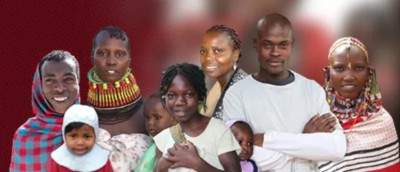Africa: MANI - Reaching the Unreached

DEPLOYING THE POWER OF PRAYER TOWARDS THE UNFINISED TASK MANI is the acronym for Africa’s mission organization called the Movement of African National Initiatives. The body was birthed in the year 2000 after the expiration of AD 2000 and Beyond Movement. The expiration of the Movement and the winding down of its structure, created a vacuum in the mission space, which Christians from African nations decided to fill, by setting up a mission body called MANI. Therefore, MANI was the African response to the necessity of mobilizing the Church to reach the remaining unengaged and Unreached People Groups in Africa.
STATISTICS
Today, there are about 981 Unengaged and Unreached People Groups (UPGs) in Africa alone. According to Joshua Project, the statistics of the UPGs in Africa reads thus:
Population - 1,163,884,000
Number of countries - 58
Number of People Groups - 3,712
Population in Unreached People Groups - 329,848,000
People Groups Unreached - 981 (26.4%)
Most of the UPGs are in regions that are either hostile to the gospel or very difficult to access. This constitutes a great challenge to the Church in Africa. As long as the Unreached People Groups remain unevangelized, the Church cannot claim to have accomplished its task of evangelizing the continent, let alone the world. This means that engaging and evangelizing the remaining Unreached People Groups is one major task before the entire Church in Africa.
AFRICA’S UNREACHED PEOPLES IN EUROPE
There is also the challenge of the Unreached Peoples of Africa in Diaspora.
“According to an estimate by The Migration Policy Institute, seven to eight million African irregular migrants now live and work in Europe. Jason Mandryk, from Operation World, indicated that in 2000 A.D. France had 6.4 million foreign-born immigrants (3.4% of all immigrants), mainly of North African and Black African origins; while Spain had 4.7 million of such (2.5% of all immigrants) of Latin America and North and West Africa origins.
Helen Trauner,1 quoting Julien Conde and P. Diagne,2 stated that “until the 1980s, four-fifths of sub-Saharan immigrants in France were originating from Senegal, Mauritania, and Mali, predominantly from the Senegal River Valley” (within the 10/40 Window, where there are significant numbers of UPGs and there is the dominant Islamic religious block) and that “more than ninety percent of Malian immigrants in France originate from the rural areas of the Kayes Region in the western part of Mali.”
She continued that the female immigrants who were her main focus of the research, like their male counterparts, originated “from the Senegal River Valley (Mali, Mauritania, Senegal) as well as from the Gulf of Guinea and from Equatorial Africa” (all of them locations of most of the African UPGs). These West African female immigrants in France provided their compatriots an African “imagined community where they meet, communicate in their mother tongue, and have access to an important infrastructure (e.g., to mosques, Islamic schools, markets, etc.).”According to Reuben Ezemadu, the Continental Co-ordinator of MANI, “This phenomenon made it possible for the African immigrants from the homogenous and closely-knit people groups of West Africa not to be assimilated by the French culture, thereby maintaining their people group uniqueness, even in such distant lands of Europe and despite many years of their sojourn there.”
THE PERSECUTION INDEX
Aside from the challenge of the UPGs both home and abroad, there is the issue of the persecuted Church in Africa. According to the Guardian, “Out of 50 countries listed by Open Doors, the six where most Christians were killed for directly faith-related reasons were in sub-Saharan Africa: Nigeria, Central African Republic, Chad, Democratic Republic of Congo, Kenya and Cameroon.” The same source states that “More than 2 million people, many of them Christians, have been forced to leave their homes in northern Nigeria, where the Islamist terror group Boko Haram is waging a campaign. Open Doors also reported violence against Christian farmers by Hausa-Fulani tribesmen, conservatively estimating more than 1,500 religiously motivated killings. Both Boko Haram and Hausa-Fulani “are carrying out religious cleansing, aiming to eradicate Christianity”
DEPLOYING THE PRAYER RESOURCE
Great amount of resources (men, prayer, financial, technology, human capital development, Strategic planning and thinking, etc) are needed to complete the task of reaching the UPGs of Africa and those in the diaspora. But these resources, not matter how vital and many, would be ineffective without the deployment of the power of strategic prayer. Only the power of unceasing prayer can change the spiritual equation and scenario among African Unreached Peoples. Prayer is the most tested and most potent resource needed by the Church to effectively accomplish its task. It is the groundbreaker that paves the way for any meaningful missionary work to take place.
PRAYER AND MISSION GATHERING
It is against this backdrop of the UPGs and the growing persecution of the Church in Africa, that the Strategic Prayer Network of MANI is calling together prayer leaders, Intercessors, missionaries, and mission strategists to a four days consultation and time of prayer from the 6th to the 10th of November in Nairobi, Kenya, aimed at facilitating the unfinished task. The prayer that can move the work of missions forward in Africa must be unceasing, persistent and strategic.
AUSTEN UKACHI
CO-ORDINATOR, STRATEGIC PRAYER NETWORK, MANI